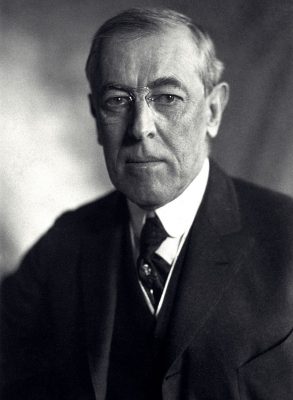The 28th President of the United States, Woodrow Wilson was a central figure in American politics during the early 20th century. First elected in 1912, Wilson oversaw the US entry into World War I and helped to shape the Treaty of Versailles. He also championed the creation of the League of Nations, although the US Senate ultimately refused to ratify US membership. In his second term, Wilson was faced with the challenge of dealing with the aftermath of the war and a growing domestic crisis brought on by the 1918 flu pandemic. His health deteriorated during this time, and he was ultimately unable to effectively lead the country. Wilson’s legacy is complex, but he is generally remembered as a visionary statesman and a champion of democracy.
Domestic Policies
Woodrow Wilson was a Democrat who believed in the principles of progressivism. One of his most famous domestic initiatives was the creation of the Federal Reserve System, which helped to stabilize the US economy and prevent financial panics. He also signed into law the Federal Trade Commission Act, which established the FTC as an independent agency to investigate and prosecute unfair trade practices.
In his second term, Wilson was faced with a number of domestic challenges, including strikes from workers. In 1915, the railroad brotherhoods demanded an 8-hour workday and overtime pay. However, railroad companies rejected the proposal and the brotherhoods threatened to organize a national strike. Wilson intervened because the strike would affect war preparedness. The Adamson Act of 1916 was eventually passed. It was a federal law that established an 8-hour workday for railroad workers as well as additional pay for overtime work. The act was named after its sponsor, Congressman Adamson of Georgia and signed into law by President Wilson. However, his efforts to promote social and economic justice were largely overshadowed by the outbreak of World War I.
Foreign Policy
When World War I broke out in 1914, the United States adopt a policy of neutrality. Wilson believed that the US should stay out of the conflict, but he also recognized that the country needed to be prepared in case it was drawn into the war. In 1916, Wilson was re-elected on the slogan “He kept us out of war.” However, on April 1917, Wilson asked Congress to declare war on Germany and the US entered World War I. He believed that the war was a fight for democracy and that the US had a responsibility to help ensure that democracies around the world were not destroyed by the Central Powers.
“Wilsonianism” was the term for Wilson’s idealistic foreign policy. It called for self-determination of peoples, open diplomacy, and the spread of democracy around the world. At the end of World War I, Wilson was one of the architects of the Treaty of Versailles. The treaty was signed in 1919 and formally ended the war. It also laid out the terms of peace between the Allies and Germany. Wilson’s vision for the treaty was that it would create a lasting peace based on justice and fairness. However, many of Wilson’s idealistic proposals were not accepted by the other world leaders. The treaty included provisions for the creation of the League of Nations, but it also allowed for military force to be used to enforce the terms of the treaty. This was a departure from Wilson’s original vision for the League, which was that it would be a peaceful organization that would resolve disputes between nations through negotiation and mediation.
The US Senate ultimately rejected the Treaty of Versailles and the US never joined the League of Nations. This was a major setback for Wilson’s foreign policy vision. However, Wilson was a driving force behind the creation of the League of Nations and the League was a precursor to the United Nations. Wilson’s legacy in foreign policy is complex, but he is generally remembered as a visionary statesman who was ahead of his time.
Racist Practices
Woodrow Wilson was a Democrat from the American South who supported segregation. He was elected president in 1912, in part due to the support of southern Democrats. During his first term, he appointed cabinet members who had Southern racist views, including William McAdoo who fired many black workers and segregated his departments. When Wilson was the president of Princeton University (formerly College of New Jersey), he discouraged an African-American student from enrolling and said it was “inadvisable for a colored man” to attend the university.
In 1914, he signed into law the Harrison Narcotics Tax Act, which imposed taxes on the sale of morphine and other opiates. The act was designed to target drug dealers, but it also had the effect of criminalizing drug users, who were disproportionately black. In 1915, Wilson appointed John J. Pershing as head of the US Army. Pershing was a supporter of segregation and he implemented segregated units in the army. Wilson also supported the implementation of literacy tests and other voter suppression measures in the South. These measures were designed to disenfranchise black voters. While Wilson might not have directly implemented racist policies, he tacitly supported them and did little to stop them.
He once said, “segregation is not a humiliation but a benefit, and ought to be so regarded by you gentlemen.” He also said that black people were “not capable of self-government” and that they should be governed by white people. Wilson’s views on race were in line with the mainstream beliefs of his time. His policies and actions helped to legitimize and perpetuate racism in the United States.
Woodrow Wilson was a complicated figure who left a mixed legacy. He was a progressive reformer who helped to create many of the institutions we take for granted today, but he was also a racist who supported segregation. Wilson’s legacy is complex and contested, but he remains an important figure in American history.
